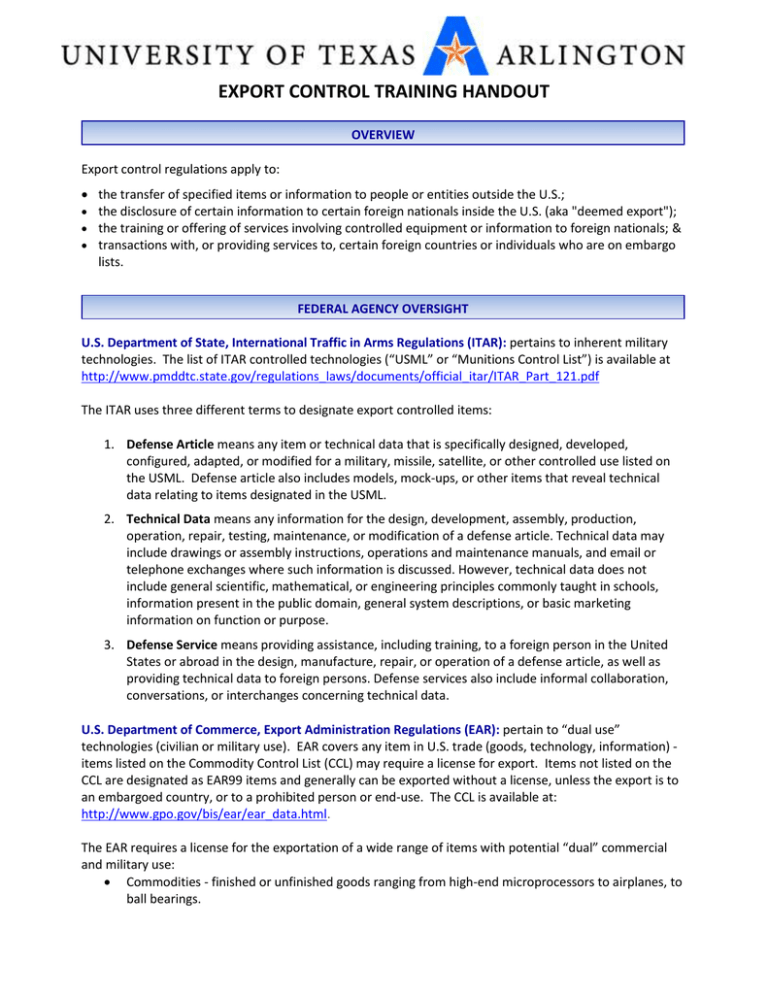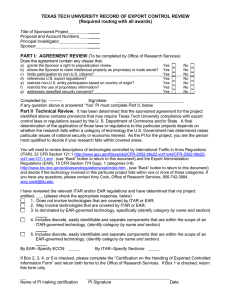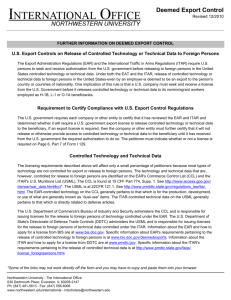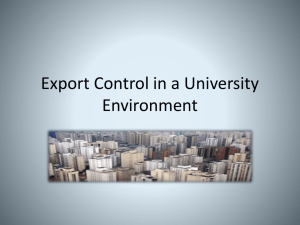EXPORT CONTROL TRAINING HANDOUT
advertisement

EXPORT CONTROL TRAINING HANDOUT OVERVIEW Export control regulations apply to: the transfer of specified items or information to people or entities outside the U.S.; the disclosure of certain information to certain foreign nationals inside the U.S. (aka "deemed export"); the training or offering of services involving controlled equipment or information to foreign nationals; & transactions with, or providing services to, certain foreign countries or individuals who are on embargo lists. FEDERAL AGENCY OVERSIGHT U.S. Department of State, International Traffic in Arms Regulations (ITAR): pertains to inherent military technologies. The list of ITAR controlled technologies (“USML” or “Munitions Control List”) is available at http://www.pmddtc.state.gov/regulations_laws/documents/official_itar/ITAR_Part_121.pdf The ITAR uses three different terms to designate export controlled items: 1. Defense Article means any item or technical data that is specifically designed, developed, configured, adapted, or modified for a military, missile, satellite, or other controlled use listed on the USML. Defense article also includes models, mock-ups, or other items that reveal technical data relating to items designated in the USML. 2. Technical Data means any information for the design, development, assembly, production, operation, repair, testing, maintenance, or modification of a defense article. Technical data may include drawings or assembly instructions, operations and maintenance manuals, and email or telephone exchanges where such information is discussed. However, technical data does not include general scientific, mathematical, or engineering principles commonly taught in schools, information present in the public domain, general system descriptions, or basic marketing information on function or purpose. 3. Defense Service means providing assistance, including training, to a foreign person in the United States or abroad in the design, manufacture, repair, or operation of a defense article, as well as providing technical data to foreign persons. Defense services also include informal collaboration, conversations, or interchanges concerning technical data. U.S. Department of Commerce, Export Administration Regulations (EAR): pertain to “dual use” technologies (civilian or military use). EAR covers any item in U.S. trade (goods, technology, information) items listed on the Commodity Control List (CCL) may require a license for export. Items not listed on the CCL are designated as EAR99 items and generally can be exported without a license, unless the export is to an embargoed country, or to a prohibited person or end-use. The CCL is available at: http://www.gpo.gov/bis/ear/ear_data.html. The EAR requires a license for the exportation of a wide range of items with potential “dual” commercial and military use: Commodities - finished or unfinished goods ranging from high-end microprocessors to airplanes, to ball bearings. Manufacturing Equipment - includes equipment specifically for manufacturing or testing controlled commodities, as well as certain generic machines, such as computer numerically controlled (“CNC”) manufacturing and test equipment. Materials - includes certain alloys and chemical compounds. Software - includes software specifically associated with particular commodities or manufacturing equipment, as well as any software containing encryption and the applicable source code. Technology - includes both technical data, and services. Unlike the ITAR, there is generally no distinction between the two. U.S. Department of the Treasury, Office of Foreign Assets Control (OFAC): Prohibits certain transactions with countries subject to boycotts, trade sanctions, and embargoes. Countries currently sanctioned are the Balkans, Burma, Cuba, Iran, Iraq, Liberia, Libya, North Korea, Sudan, Syria, and Zimbabwe. This list is subject to change. This prohibition includes importation and exportation of goods and services, whether direct or indirect, as well as "facilitation" by a U.S. person of transactions between foreign parties and a sanctioned country. For example, sending a check to an individual in Iran could require an OFAC license or be prohibited. Terrorist and Other Barred Entity Lists: Various U.S. Government agencies maintain a number of lists of individuals or entities barred or otherwise restricted from entering into certain types of transactions with U.S. persons. Such lists must be screened to ensure that the university does not engage in a transaction with a barred entity. UT Arlington, under a UT system-wide license, uses Visual Compliance™ to expedite screening of these and other lists: Specially Designated Nationals and Blocked Persons List (“SDN List”). Maintained by OFAC, this is a list of barred terrorists, narcotics traffickers, and persons and entities associated with embargoed regimes. Generally, all transactions with such persons are barred. The SDN List is available at: http://www.treas.gov/offices/enforcement/ofac/sdn/index.shtml. Persons Named in General Orders (15 C.F.R. § 736, Supp. No. 1). General Order No. 2 contains the provisions of the U.S. embargo on Syria; General Order No. 3 prohibits the re-exports to Mayrow General Trading and related parties: http://www.access.gpo.gov/bis/ear/pdf/736.pdf. List of Debarred Parties. The Department of State bars certain persons and entities from engaging in the export or re-export of items subject to the USML: http://www.pmddtc.state.gov/compliance/debar.html. Note that the number of countries subject to a U.S. arms embargo is much broader than those subject to OFAC embargoes. See http://www.pmddtc.state.gov/embargoed_countries/index.html. Denied Persons List. These are individuals and entities that have had their export privileges revoked or suspended by BIS: http://www.bis.doc.gov/dpl/Default.shtm. Entity List. These are entities identified as being involved in proliferation of missile technology, weapons of mass destruction, and related technologies: http://www.bis.doc.gov/Entities/Default.htm. Unverified List. These are foreign persons and entities for which BIS has been unable to verify the nature of their operations. While transactions with these entities are not barred, special due diligence is required: http://www.bis.doc.gov/Enforcement/UnverifiedList/unverified_parties.html. Excluded Parties List. These are entities that have been barred from contracting with U.S. Government agencies. In general, companies cannot contract with such parties in fulfilling a U.S. Government contract, either as prime or sub-contractor: http://www.epls.gov/. Nonproliferation Sanctions maintained by the Department of State: http://www.state.gov/t/isn/c15231.htm. Regulatory Services, Research Administration Export Control Training Handout (rev. May 2013) Page 2 of 6 EXCLUSIONS TO THE EXPORT CONTROL REGULATIONS Generally, UT Arlington faculty and employees may not send or provide access to export-controlled equipment, chemicals or technologies to foreign persons without a license from the U.S. Government, unless an exclusion applies. Also, any transaction with certain countries, individuals, or entities may be a violation. Fortunately, the majority of research at UT Arlington is covered under an exclusion to the export control regulations: 1. PUBLICLY AVAILABLE / PUBLIC DOMAIN - The ITAR and the EAR do not control information which is published and generally accessible or available to the public. Note that even though the two regimes have similar scope, the ITAR and the EAR vary in the specific information that qualifies as publicly available. a. ITAR provision: The ITAR describes such information as information in the public domain. The information in the public domain may be obtained through: i. sales at newsstands and bookstores; ii. subscription or purchase without restriction to any individual; iii. second class mailing privileges granted by the U.S. Government; iv. at libraries open to the public; v. patents available at any patent office; vi. unlimited distribution at a conference, meeting, seminar, trade show or exhibition, generally accessible to the public, in the United States; vii. public release in any form after approval of the cognizant U.S. Government agency; viii. fundamental research in the U.S. (See definition for Fundamental Research below). b. EAR provision: The EAR does not control publicly available technology if it is already published or will be published. Information is published when it becomes generally accessible to the interested public in any form, including: i. publication in periodicals, books, print, etc., available for general distribution free or at cost; ii. readily available at libraries open to the public or university libraries; iii. patents and open patents applications available at any patent office; or iv. release at an open conference, meeting, seminar, trade show, or other gathering open to the public. The EAR requires that the publication is available for distribution free or at price not to exceed the cost of reproduction and distribution; however, the ITAR does not have such a requirement. Note also that the EAR does not specify where an open conference, meeting, seminar or trade show must take place, and thus allows, for example, participation at a foreign conference so long as the conference is open to all technically qualified members of the public, and attendees are permitted to take notes. Unlike the EAR, the ITAR limits participation in conferences and similar events to those that are taking place in the United States. 2. EDUCATIONAL INFORMATION - Both the ITAR and the EAR address the issue of general educational information that is typically taught in schools and universities. Such information, even if it relates to items included on the USML or the CCL, does not fall under the application of export controls. a. ITAR provision: The ITAR specifically provides that the definition of "technical data" does not include information concerning general scientific, mathematical or engineering principles commonly taught in schools, colleges and universities. b. EAR provision: The EAR provides that publicly available "educational information" is not subject to the EAR, if it is released by instruction in catalogue courses and associated teaching laboratories of academic institutions. Regulatory Services, Research Administration Export Control Training Handout (rev. May 2013) Page 3 of 6 Therefore, a university graduate course on design and manufacture of very high-speed integrated circuitry will not be subject to export controls, even though the technology is on the CCL. The key factor is the fact that the information is provided by instruction in a catalogue course. Foreign students from any country may attend this course because the information is not controlled. The information will not be controlled even if the course contains recent and unpublished results from laboratory research, so long as the university did not accept separate obligations with respect to publication or dissemination, e.g., a publication restriction under a federal funding. 3. FUNDAMENTAL RESEARCH – defined as “Basic and applied research in science and engineering, the results of which ordinarily are published and shared broadly within the scientific community, as distinguished from proprietary research and from industrial development, design, production, and product utilization, the results of which ordinarily are restricted for proprietary or national security reasons.” The results of research performed as fundamental research as defined above are not subject to export control laws and regulations. No license is needed to share these results, even if they relate to items or technologies that are otherwise controlled. This exclusion permits UT Arlington to allow foreign members of their communities (e.g., students, faculty, and visitors) to participate in research projects involving export-controlled information on campus in the U.S. without the need for a license. However it does not permit the transfer of export controlled information, materials, or items abroad, even to research collaborators, except under very limited circumstances. The Fundamental Research Exclusion applies only to the dissemination of research data and information, not to the transmissions of material goods. Under both the ITAR and the EAR, research performed at universities will not qualify as fundamental if the university (or the primary investigator) has accepted publication or other dissemination restrictions: ITAR provision: the fundamental research exception does not apply to research the results of which are restricted for proprietary reasons, or specific U.S. Government access and dissemination controls. EAR provision: fundamental research is distinguished from proprietary research and from industrial development, design, production, and product utilization, the results of which ordinarily are restricted for proprietary reasons or specific national security reasons. Under the EAR, university-based research is not considered fundamental research if the university or its researchers accept restrictions (other than review to ensure no release of sponsor-provided proprietary or patent information) on publication of scientific and technical information resulting from the project. The EAR instructs that prepublication review by a sponsor of university research solely to ensure that the publication would not inadvertently divulge proprietary information that the sponsor has initially furnished, or compromise patent rights, does not constitute restriction on publication for proprietary reasons. 4. FULL-TIME UNIVERSITY EMPLOYEES – Under a specific exemption, the ITAR allows a university to disclose unclassified technical data in the U.S. to a foreign person who is the university’s bona fide and full time regular employee. The exemption is available only if: the employee's permanent abode throughout the period of employment is in the United States; the employee is not a national of a country to which exports are prohibited pursuant to ITAR § 126.1 (See current list of countries at http://www.pmddtc.state.gov/regulations_laws/documents/official_itar/ITAR_Part_126.pdf) Regulatory Services, Research Administration Export Control Training Handout (rev. May 2013) Page 4 of 6 the university informs the individual in writing that the technical data may not be transferred to other foreign persons without the prior written approval of DDTC; and the university documents the disclosure of technical data under the exemption providing: (1) a description of the technical data; (2) the name of the recipient / end-user; (3) the date and time of export; (4) the method of transmission (e.g., email, fax, FedEx); (5) the ITAR reference, i.e., ITAR § 125.4(b)(10), Full-Time University Employee. Note that the "full-time bona fide employee" requirement will preclude foreign students and postdoctoral researchers from qualifying for access to technical data under this exemption. Generally, a H1B work visa would be required. This exemption only applies to the transfer of technical data and discussions related to the data. Discussions may occur between the foreign fulltime employee and other university employees working on the project. Additionally, the outside company (sponsor of the research) would have to apply for a DSP-5 license to provide technical data directly to the foreign national employee, and if the outside party and the employee are to engage in discussions and interchange concerning the data, then the proper authorization would be a Technical Assistance Agreement (TAA) rather than the DSP-5. DEEMED EXPORTS One of the most difficult issues with respect to export controls is the fact that an export is defined to include the transfer of controlled information or services to foreign nationals even when the transfer takes place within the territory of the United States. Though taking place inside the U.S., the transfer is “deemed” to be an export (as if exporting to the country of the foreign national). Such transfer or release may be made through oral, visual, or other means through: 1. 2. 3. 4. 5. 6. 7. 8. 9. 10. 11. 12. a demonstration; oral briefing; telephone call or message; laboratory or plant visit; presenting at conferences and meetings; faxes or letters; hand-carried documents, hardware or drawings; design reviews; the exchange of electronic communication; posting non-public data on the Internet or the Intranet; carrying a laptop with controlled technical information or software to an overseas destination; collaborating with other universities / research centers through research efforts. For purposes of defense and dual-use exports, a U.S. person is defined as a U.S. entity or a U.S. citizen, a person lawfully admitted for permanent residence in the United States (i.e., green card holder), or a person who is a protected individual under the Immigration and Naturalization Act. **Unless the fundamental research exclusion applies, a university’s transfer of controlled (on the CCL or the USML) technology to a non-U.S. person may require a license from the Departments of Commerce or State and/or be prohibited! Regulatory Services, Research Administration Export Control Training Handout (rev. May 2013) Page 5 of 6 TECHNOLOGY CONTROL PLANS If it is determined that a project is export controlled, Regulatory Services will work with the PI to develop and implement a TCP to secure the controlled technology/data from access by unlicensed non-U.S. persons. The TCP will include: a briefing/training section for all TCP personnel to review and certify understanding, identification of the export controlled items, identification of the project’s sponsor(s), identification and nationality of all project personnel, appropriate physical and informational security measures (e.g., laboratory compartmentalization, time blocking, locked storage, electronic security, etc.), personnel screening measures. The TCP will be signed by each project personnel and the Empowered Official (EO) for export control, Jeremy Forsberg – Assistant Vice President for Research. The TCP will also include plans for self-monitoring and assessment on a routine basis during the duration of the project. LICENSING If a project is export controlled and a license is needed to involve a foreign national or to physically export an item, an Empowered Official may apply for an export license to allow the disclosure of information to foreign students and researchers. Note that each non-U.S. person must be specifically licensed for each controlled project. Also note that a TCP, as described above, must be implemented. PENALTIES FOR VIOLATIONS Generally, any person or entity that brokers, exports, or attempts to export a controlled item without prior authorization, or in violation of the terms of a license, is subject to penalties. Violators may incur both criminal and civil penalties. The Arms Export Controls Act and the ITAR provide that willful violations of the defense controls can be fined up to $1,000,000 per violation, or ten years of imprisonment, or both. In addition, the Secretary of State may assess civil penalties, which may not exceed $500,000 per violation. The civil penalties may be imposed either in addition to, or in lieu of, any other liability or penalty. The articles exported or imported in violation, and any vessel, vehicle or aircraft involved in such attempt is subject to seizure, forfeiture and disposition. Finally, the Assistant Secretary for Political-Military Affairs may order debarment of the violator, i.e., prohibit the violator from participating in export of defense items. Similarly to the ITAR, violations of the EAR are subject to both criminal and administrative penalties. Fines for export violations, including anti-boycott violations, can reach up to $1,000,000 per violation in criminal cases, and $250,000 per violation in most administrative cases. In addition, criminal violators may be sentenced to prison time up to 20 years, and administrative penalties may include the denial of export privileges. CONTACT For more information, please contact Regulatory Services at regulatoryservices@uta.edu or 817-272-1234, or view the Research Administration website: http://www.uta.edu/research/administration/. Regulatory Services, Research Administration Export Control Training Handout (rev. May 2013) Page 6 of 6



